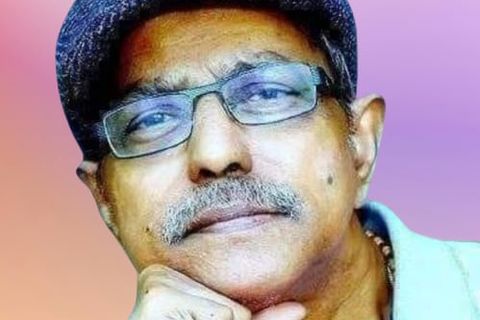RECKLESS REVOLUTION - STORY BY WILLIAMSJI MAVELI

THE PERIYAR’S SECRET JOURNEY
"None of us have ever heard of such a journey... Maybe it was during the days when we were living apart, Viswanathan," Ramya murmured, her gaze fixed on him.
Viswanathan leaned back, a faint smile playing on his lips. "It wasn't a journey across states or continents, Ramya. It was a journey into the quiet places within, and into the forgotten corners of this very land." He looked out the studio window, as if seeing beyond the city sprawl. "The Periyar, you see, is not just a river. It’s a metaphor that flows through our collective consciousness. It remembers. It holds secrets."
He began, his voice soft, almost a whisper, yet resonating with the weight of years. "After my release, after the books were written, the movie made, the anger simmered, but the true answers eluded me. I thought revolution was a grand upheaval, a decisive break. But the Periyar, this ancient river, teaches you patience. It flows, it carves, it nourishes, it floods, but it always flows. It doesn't rage perpetually. It finds its way. That’s when I realized my understanding of revolution was incomplete."
"My journey began by revisiting the periphery of the Kakkayam camp, not to relive the horror, but to understand its lasting ripples. I sought out not the revolutionaries, not the victims, but the ordinary folk who lived through it all, who picked up the pieces. I wanted to see if their 'river of life' had dried up, or if it had merely changed course."
He recalled meeting an old woman, frail but with eyes that held the wisdom of ages, tending a small patch of ginger by a trickling stream, a tributary of the Periyar. She spoke not of politics or ideology, but of the land, the crops, the changing seasons. She had lost a son during those times, not to torture, but to the despair that followed, a slow, silent fading. Yet, she found solace in the earth. "She taught me that real change isn't always about tearing down; sometimes, it's about nurturing what remains, about the quiet, relentless growth of life after devastation."
"My 'secret journey' then took me to the headwaters of the Periyar, deep into the Western Ghats. It wasn't about finding a person, but about finding a perspective. I spent weeks, living simply, observing. The river there, pristine and powerful, taught me about its capacity for both creation and destruction. It does not rage for rage’s sake. It simply is. It carved the rocks of ages, just as life carves us. But it doesn't hold onto the past. It keeps flowing. And in that flow, I saw the true resilience of a society."
He continued, "We hold onto unhappy scenes from the past, chewing on memories. This glut of thoughts profoundly affects the world we perceive. But nature, the very river, is alive, moving, reproductive. We observe growth and development, contrasted with the static or deteriorating state of man-made things. Beauty is in what has no superfluous parts, what exactly answers its end, what relates to all things. In nature, individuals are not independent; they are intimately interconnected. Rivers do not drink their own water; they give. This was the missing piece in my understanding of revolution – it must be for others, not just against something."
Ramya found herself captivated. This was a side of Viswanathan she hadn't anticipated – a blend of the fiery intellectual and the serene philosopher.
"There was a time when a river was in everyone’s life," Viswanathan mused, his voice carrying the weight of history. "Cultures developed alongside them, they sustained farmlands, were home to fish, conduits of commerce and cultural exchange. They were revered and feared, playmates and unpredictable elders. People learned to live with their vagaries, their ebbs and flows. But this connection was severed, especially during colonial rule, when rivers became mere resources, 'tapped' and 'barraged' by a foreign understanding of hydrology that couldn't grasp their unique, sediment-rich nature. And sadly, our own planners continued that folly."
He sighed. "We’ve lost our spiritual connection. Many mighty rivers are reduced to trickles, or worse, to toxic cesspools. We venerate them ritually, but burden them with trash. These rivers, once living entities, are now official 'drains.' There cannot be a bigger loss, a bigger travesty."
Ramya felt a pang. It resonated with the disillusionment she often felt in her own investigative journalism. The continuous fight against corruption, against environmental degradation – it often felt like battling a raging current with bare hands.
"Living for others is a rule of natural history," Viswanathan reiterated, looking at Ramya with newfound emphasis. "We are all born to assist each other. Life is excellent when you are cheerful, but much better when others are blissful, because of the creator of this universe." He paused, then his eyes twinkled. "This is not just spirituality, Ramya. This is the bedrock of true societal change, the revolution that truly lasts. Gandhiji understood this. His question about Kochi, about the poor and neglected amidst the city's glamour, is still relevant today."
"He changed the freedom struggle from an upper-class affair into that of the common man and the farmer. Communism won in Kerala precisely because it started that way and went further. Non-violence and violence may have diverged, but both started with the same goal. Perhaps Communism is an advanced form of fascism or vice versa – they are not entirely contradictory. No wonder Chandran and I find common ground. It makes me wonder if the comrades in India truly recognized this."
Ramya pondered this, the nuances of history unfolding before her. The path Gandhi began, she realized, was indeed empty today.
Days turned into weeks. Murugan's campaign in Alappuzha became a crucible for Viswanathan's new philosophy. He insisted on community dialogues over grand rallies, on tangible local issues over abstract ideologies. Ramya, with her sharp journalistic eye, documented it all. She saw the initial skepticism of the party cadres, then the slow, almost imperceptible shift in the rural heartland. Viswanathan spoke of the 'river of change' finding its course, even through the political landscape.
A week before the election, a video went viral. It wasn't from their camp. It was old, grainy footage, secretly recorded during the Emergency. It showed a young man, clearly in distress, being dragged into what looked like the Kakkayam camp. The face was blurred, but the accompanying voiceover, digitally enhanced, claimed it was the missing engineering student. And then, a fleeting glimpse of another man, older, in a reporter's vest, being led away in the background – a younger Viswanathan.
The video also contained a chilling audio segment: a panicked voice, muffled, then a distinct, echoing "olakka" thud. The final frame was a blurred image of a man, eyes wide with terror, his face a chilling mirror of the student's father's grief. This man, the voiceover claimed, was a low-level informant, a man who survived Kakkayam but had been complicit in identifying others. The video demanded justice, reigniting the trauma of the Emergency in a raw, personal way. It was an anonymous attack, designed to destabilize Murugan's campaign by associating it with a past that, for many, was still an open wound. The opposition was quick to capitalize, accusing Murugan's party of harboring elements linked to past atrocities.
Panic erupted in the campaign office. "This is designed to create absolute chaos!" David exclaimed, his face pale. "It's hitting us where it hurts, dragging up old ghosts!"
"This is not the chaos we want!" Murugan cried, distraught. "It's manufactured fear!"
Ramya watched Viswanathan. He was uncharacteristically silent, his face etched with a profound weariness. The "unseen current" had become a torrent of toxic memory.
"My secret journey, Ramya," Viswanathan finally said, his voice barely audible, "I found that informant. The man from the video, the one who survived Kakkayam and identified others. He carries the weight of it every day. He's been living in exile, a broken man. He reached out to me, desperate to unburden himself, to confess what he saw."
He pulled out a small, worn diary. "He recorded everything. Not just the physical torture, but the psychological warfare. The names of the true orchestrators, the ones who gave the orders, not just the foot soldiers. He had been trying to find a way to make it public for decades, living in fear."
"Why now?" Ramya asked, her journalist's instinct kicking in.
"He told me his health was failing. He wanted to die with a clear conscience. I had convinced him to come forward after the elections, to speak his truth on a platform that wasn't politically tainted, on my new online forum for quiet voices of revolution. But someone else found him. Someone else released a twisted, partial version of his truth to derail this campaign."
The room buzzed with frantic energy. "We have to denounce it!" "No, we confirm it and turn it around!"
Viswanathan stood up, a new resolve hardening his features. "We don't deny it. We don't just 'denounce.' We tell the whole truth. This is the moment. The river of memory has flooded; we either drown in it or channel it. This chaos, this ugliness, can be turned into something good if we face it head-on with authenticity."
He looked at Ramya. "You spoke of truth cutting through the noise. This is our chance. We publish his full account, his full confession, with all the names. Not just what they did to him, but what he was forced to do, and the names of those who truly orchestrated it, far beyond what the initial video revealed. We show that the real revolution is about uncovering the truth, no matter how painful, and holding everyone accountable."
Ramya knew the risks. It could blow up in their faces. It could incriminate people still in power, or their descendants. But it also felt like the most profoundly revolutionary act imaginable. It wasn't just about winning an election; it was about finally, truly, cleaning the polluted river of history.
The television interview was a national phenomenon. Ramya, poised and determined, sat opposite Viswanathan, his voice calm but resonant as he read excerpts from the informant's diary. He spoke of the "uruttal" again, not as a political accusation, but as a chilling reminder of the depths of human cruelty. But then, he detailed the informant's lifelong guilt, his desperate need for atonement, and the names of high-ranking officials, long retired or deceased, who had pulled the strings. He didn't spare the informant's complicity, but he also highlighted his courage in the face of death to finally reveal the full truth.
The effect was not what the opposition had intended. Instead of a smear, it became an unprecedented act of collective reckoning. The pain of the Emergency, so long suppressed or selectively remembered, was brought into the light. People didn't see a political maneuver; they saw a desperate cry for truth from a man who had suffered twice over. The "chaos" of the leaked video, indeed, led to an unexpected "good"—a moment of profound societal introspection.
Murugan's campaign, instead of collapsing, gained an unexpected moral authority. Voters, weary of political mudslinging, responded to the raw honesty. The election results were a landslide, not just for Murugan, but for a new kind of politics, one that sought to heal rather than merely win.
Viswanathan, the man who wanted to create chaos, found himself an unlikely architect of reconciliation. He never returned to conventional journalism. Instead, he dedicated his life to an online platform he named "Periyar Echoes," a space for forgotten voices, for quiet truths, for the meticulous documentation of history's unseen currents. It became a digital archive of revolutions both grand and subtle, a testament to the idea that the river of life, no matter how dammed or diverted, always finds its way, cleansing and nourishing along its path.
Ramya continued her work as an investigative journalist, but with a deeper understanding. The "Prasakthi" incident, the "Kabani" movie, the "uruttal" – they were no longer just historical facts but living currents that shaped the present. She specialized in stories that exposed the "game behind the game," shedding light on vested interests and hidden agendas, always striving for the authenticity Viswanathan had preached. She realized that her own river, her journalism, flowed best when it uncovered the truth, even the uncomfortable ones.
Shyamala remained her steadfast friend, a quiet anchor in the stormy world of news. David, the pragmatist, embraced the new political landscape, finding that honesty, even brutal honesty, could be the most effective strategy.
The Angamaly airport continued to hum with the ceaseless rhythm of arrivals and departures, a symbol of constant movement. And nearby, the Periyar flowed, ancient and wise, a silent witness to the ebb and flow of human lives, of revolutions fought and won, of truths revealed, and of the enduring, unseen current that forever shapes the course of society. The Emergency had ended, but its lessons, carried by the river of memory, continued to shape the present, reminding everyone that while the river might change course, its essence – the unwavering flow of life – would always prevail.
Like 0 Pin it 0



